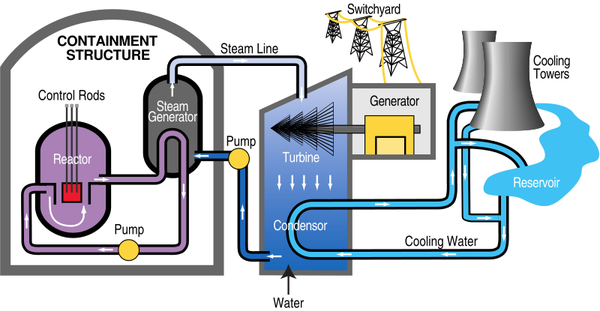Difference between revisions of "Nuclear Fuel"
(→Meaning) |
(→Power) |
||
| Line 24: | Line 24: | ||
: 4. The turbine causes a generator to spin. | : 4. The turbine causes a generator to spin. | ||
: 5. The generator makes an electrical current. | : 5. The generator makes an electrical current. | ||
| + | |||
| + | ====Advantages==== | ||
| + | *Can work continuously. | ||
| + | *Power supply can be varied depending on demand. | ||
| + | *Few power stations needed to supply a large number of houses. | ||
| + | *High energy density (1kg of Uranium can provide the same energy as 10,000kg of coal). | ||
| + | |||
| + | ====Disadvantages==== | ||
| + | *Cost of fuel. | ||
| + | *Disposal of nuclear waste. | ||
| + | *Risk of meltdown. | ||
Revision as of 09:44, 9 October 2018
Contents
Key Stage 3
Meaning
Nuclear Fuel is a radioactive material which can be used to generate electricty.
About Nuclear Fuel
- Nuclear Fuel has energy in its nuclear potential energy store which can be easily transferred into its thermal energy store.
- The most common nuclear fuels are Uranium-235 and Plutonium-239.
- Nuclear Fuel transfers energy to the thermal energy store during a nuclear reaction.
- Nuclear Fuel is very dangerous because it is radioactive which causes harm to living organisms.:
- When nuclear fuel is used the waste products are still radioactive so they must be buried deep underground where they cannot harm living organisms.
Power
- Nuclear Fuel can be used to provide power by generating electricity that can be sent to houses and industry.
| A diagram of a coal power station. |
- 1. Nuclear Fuel undergoes a nuclear reaction in the reactor core.
- 2. Water in the reactor core is heated and passed through a heat exchanger.
- 3. Water in the reactor core becomes contaminated with radioactive material so the heat exchanger heats up uncontaminated water.
- 3. The uncontaminated water turns to steam and passes down pipes to turn a turbine.
- 4. The turbine causes a generator to spin.
- 5. The generator makes an electrical current.
Advantages
- Can work continuously.
- Power supply can be varied depending on demand.
- Few power stations needed to supply a large number of houses.
- High energy density (1kg of Uranium can provide the same energy as 10,000kg of coal).
Disadvantages
- Cost of fuel.
- Disposal of nuclear waste.
- Risk of meltdown.
